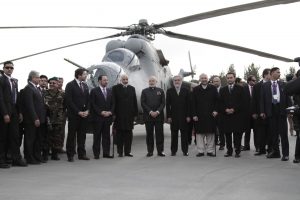As Afghan cities fall to the Taliban with alarming speed, India has accelerated the evacuation of its diplomats and other nationals from the war-ravaged country.
On Tuesday, India shut down its consulate at Mazar-e-Sharif and with that, the last of its four consulates in Afghanistan has ceased functioning. Only its embassy in Kabul is operational now.
Last month, Indian diplomats and staff were vacated from the Kandahar consulate. Its consulates at Jalalabad and Herat were shut down last year.
Also on Tuesday, India’s Ministry of External Affairs (MEA) issued an advisory — the third in three months —calling on “all Indian nationals visiting, staying and working in Afghanistan” to “make immediate travel arrangements to return to India before commercial air services are discontinued to their place of stay/visit in Afghanistan.”
All Indian companies operating in Afghanistan have been “strongly advised” to “immediately withdraw” their Indian employees out of project sites in the country. Indian nationals who are working for Afghan or foreign companies in Afghanistan have been advised to urge their employers to facilitate their travel from the respective project sites to India.
Early on Wednesday, Indian diplomats and other nationals living in and around Mazar-e-Sharif were flown back to New Delhi in a military aircraft.
India’s decision to evacuate its nationals comes amid the sharply deteriorating situation in Afghanistan. Not only is New Delhi apprehensive that Indians living and working in Afghanistan could get caught in the crossfire between the Afghan armed forces and the Taliban, but also there is concern that Indians will be specifically targeted by the Taliban, taken hostage, tortured and executed.
A month ago, Pulitzer Prize-winning Indian photojournalist Danish Siddiqui was killed while covering an encounter between Afghan forces and the Taliban in Spin Boldak in Kandahar province. According to subsequent reports, Siddiqui’s death was not accidental. He was captured alive and then executed when the Taliban found out his Indian identity. He is thought to have been tortured and killed, as evident from the mutilated condition of his body.
India’s apprehensions are therefore not without basis.
Unlike other countries, which have established ties with the Taliban in recent years, India avoided engaging the group. Given the Taliban’s strong ties with Pakistan, New Delhi has believed that the insurgent group is a proxy of Islamabad. Indeed, India has been of the view that Taliban attacks on Indian missions and nationals in Afghanistan over the past two decades were at the behest of Pakistan’s Inter-Services Intelligence (ISI).
Now as the Taliban gain ground in Afghanistan, New Delhi fears that its nationals and projects in Afghanistan are even more vulnerable to Taliban attacks.
A week ago, the Taliban fired rockets at the Afghanistan-India Friendship Dam in Herat province, but the attack was repelled by Afghan security forces. The $300 million hydropower project is among dozens of projects and initiatives that India funded over the past two decades. New Delhi is understandably worried that the $3 billion it invested in projects will be reduced to rubble by the Taliban.
In recent months, Indian media have reported that Indian officials have opened channels with Taliban leaders. The Indian government has neither confirmed nor denied these reports. However, MEA officials did say that India was engaging with “various stakeholders” in Afghanistan.
In a recent exclusive interview with India Today, Taliban spokesperson Mohammad Suhail Shaheen denied that Taliban leaders have engaged in talks with India. “According to my information, it has not happened,” he said. For talks to happen, “it is really important for India to show impartiality” between the government and the Taliban, Shaheen said, calling attention to India’s supply of military hardware to Kabul.
Earlier this week, an Mi-24 attack helicopter that India gifted the Afghan government in 2019 fell into the Taliban’s hands when they captured Kunduz.
Meanwhile, the Afghan government is said to have appealed to New Delhi to provide its forces with “robust air support.” Analysts say that India is unlikely to provide Kabul with that support, limiting its help to “benign support,” including maintenance of military hardware and supply of spare parts.
This will neither turn the war in Kabul’s favor nor appease the Taliban.

































